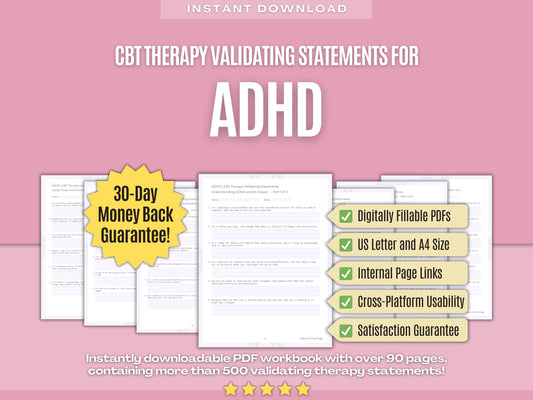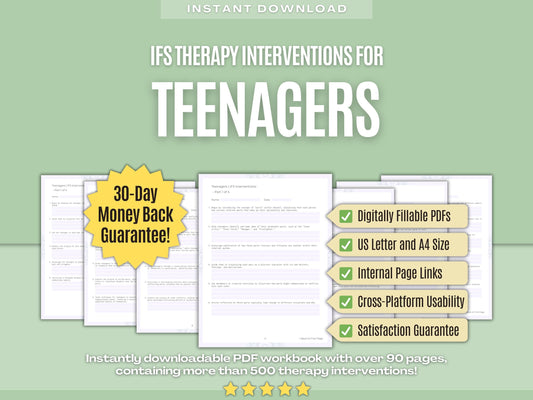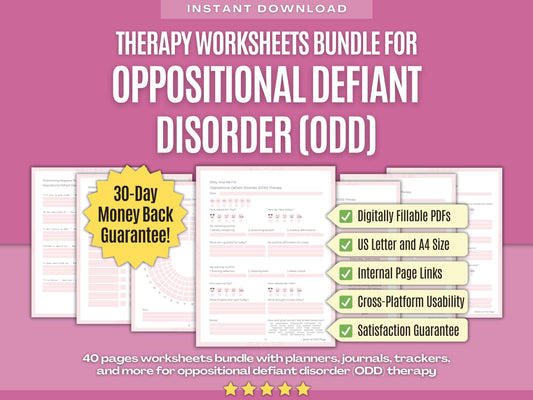Elevate Your Therapy and Guide Your Clients to Inner Healing with Our Oppositional Defiant Disorder (ODD) Coping Skills! ✨
1. Recognizing Triggers and Patterns
- Reflect on past situations to identify common triggers or patterns that lead to challenging behaviors.
- Pay attention to physical sensations such as tension, racing heart, or shallow breathing that may signal distress.
- Identify specific people, places, or situations that tend to provoke negative reactions.
- Engage in therapy or counseling to explore underlying issues and learn coping strategies.
- Use imagery or visualization exercises to imagine challenging situations and plan effective responses.
- Pay attention to thoughts and beliefs that contribute to a sense of threat or injustice.
- Practice relaxation techniques to manage stress and prevent escalation of emotions.
- Engage in activities that promote self-care and emotional regulation, such as exercise or hobbies.
- Set realistic expectations for yourself and others to reduce frustration and disappointment.
- Build resilience by fostering a sense of purpose, connection, and meaning in life.
- Practice problem-solving skills to address underlying issues contributing to triggers.
2. Building Positive Communication Skills
- Practice active listening by giving full attention to the speaker and seeking to understand their perspective before responding.
- Validate the emotions and experiences of others, even if you disagree with their perspective.
- Avoid interrupting or dominating conversations, allowing space for others to express themselves.
- Practice patience and tolerance, especially in difficult or challenging conversations.
- Clarify misunderstandings by asking open-ended questions and seeking clarification.
- Avoid sarcasm, criticism, or defensiveness, which can hinder effective communication.
- Engage in role-playing exercises to practice assertive communication in different scenarios.
- Practice giving and receiving constructive feedback in a respectful and supportive manner.
- Practice self-regulation techniques to manage emotions and impulses during communication.
- Set communication goals and track progress over time to monitor improvements.
- Use active problem-solving skills to address communication barriers and conflicts.
3. Developing Emotional Awareness
- Start by practicing mindfulness techniques to bring awareness to your current emotional state without judgment.
- Pay attention to physical sensations that accompany different emotions, such as tension, butterflies in the stomach, or a racing heart.
- Engage in regular reflection exercises to explore the root causes and underlying beliefs associated with your emotions.
- Use guided imagery or visualization exercises to explore and process intense emotions in a safe space.
- Practice deep breathing or progressive muscle relaxation to help regulate intense emotions and promote a sense of calm.
- Engage in activities that promote emotional expression, such as art, music, or writing.
- Practice acceptance of your emotions as valid and normal human experiences, even if they are uncomfortable or unpleasant.
- Practice empathy by imagining yourself in another person's shoes and considering how they might be feeling.
- Engage in regular self-care activities that nurture your emotional well-being, such as spending time in nature, practicing hobbies, or connecting with loved ones.
- Identify and challenge unhelpful or irrational thoughts that contribute to negative emotions.
- Practice gratitude and focus on positive aspects of your life to counterbalance negative emotions.
4. Establishing Clear and Consistent Boundaries
- Recognize your own boundaries by reflecting on your personal values, beliefs, and limits.
- Set clear and specific boundaries with consequences for violations to establish consistency.
- Engage in mindfulness exercises to stay present and aware of boundary-crossing behaviors.
- Role-play boundary-setting scenarios with a trusted friend or therapist to build confidence.
- Learn to say "no" assertively and without guilt when a situation conflicts with your boundaries.
- Seek support from a therapist or support group to explore underlying issues contributing to boundary challenges.
- Implement time management strategies to prioritize activities aligned with your boundaries.
- Create a boundary journal to track progress, setbacks, and insights gained along the way.
- Practice resilience by bouncing back from boundary violations and reasserting your limits.
- Surround yourself with supportive individuals who respect and reinforce your boundaries.
- Seek professional guidance if you encounter resistance or difficulty in establishing boundaries.
5. Managing Anger and Frustration
- Start by recognizing the early signs of anger and frustration, such as increased heart rate or muscle tension, to intervene before emotions escalate.
- Utilize progressive muscle relaxation techniques to release tension and promote a sense of calmness throughout the body.
- Redirect your focus by engaging in a favorite hobby or activity that provides a sense of enjoyment and distraction from negative emotions.
- Practice mindfulness meditation to cultivate present-moment awareness and acceptance of difficult emotions without judgment.
- Express your feelings through creative outlets such as writing, drawing, or music, providing a constructive means of processing and releasing emotions.
- Implement assertive communication skills to express your needs and boundaries effectively while remaining respectful of others.
- Set realistic goals and expectations for yourself to avoid feeling overwhelmed or disappointed, recognizing that progress takes time.
- Identify triggers that commonly provoke feelings of anger and frustration, and develop strategies to avoid or cope with these triggers proactively.
- Engage in relaxation activities such as taking a warm bath, listening to calming music, or practicing aromatherapy to promote a sense of tranquility.
- Practice empathy by considering the perspective of others involved in a conflict, fostering understanding and compassion for their experiences.
- Develop a personalized anger management plan outlining coping strategies and resources to utilize during difficult moments.
6. Fostering Cooperation and Teamwork
- Begin by fostering a positive and collaborative atmosphere where all individuals feel valued and respected for their contributions.
- Model effective communication techniques such as using "I" statements and expressing thoughts and feelings assertively yet respectfully.
- Set clear goals and objectives for collaborative tasks, ensuring that everyone understands their role and responsibilities.
- Encourage flexibility and adaptability in problem-solving, empowering participants to explore multiple perspectives and solutions.
- Foster a sense of shared ownership and investment in group projects by involving participants in decision-making and problem-solving processes.
- Address conflicts and disagreements openly and constructively, teaching participants conflict resolution skills such as negotiation and compromise.
- Provide opportunities for leadership and mentorship within the group, allowing individuals to develop and showcase their skills.
- Use team-building exercises to foster trust and cooperation, such as problem-solving challenges or collaborative games.
- Provide constructive feedback and encouragement to group members, recognizing progress and effort in working towards common goals.
- Create opportunities for shared decision-making and problem-solving, allowing group members to contribute their ideas and perspectives.
- Encourage resilience and perseverance in the face of setbacks or challenges, reminding group members that working together can lead to greater success.
7. Supporting Self-Esteem and Confidence
- Begin by practicing self-compassion and kindness towards oneself, acknowledging that everyone has strengths and weaknesses.
- Set achievable goals and celebrate even small successes, recognizing and affirming personal accomplishments.
- Practice gratitude by reflecting on positive aspects of yourself and your life, fostering appreciation for your unique qualities and experiences.
- Cultivate self-awareness by identifying your strengths, values, and passions, embracing what makes you uniquely you.
- Challenge perfectionism by embracing imperfection and recognizing that mistakes are opportunities for growth and learning.
- Practice assertive communication by expressing your thoughts, feelings, and boundaries confidently and respectfully.
- Surround yourself with positive influences such as inspirational books, podcasts, or role models who embody confidence and self-assurance.
- Develop a support network of friends, family, or professionals who can provide encouragement, guidance, and perspective during challenging times.
- Cultivate a growth mindset by viewing challenges as opportunities for growth and development, rather than insurmountable obstacles.
- Practice self-acceptance and forgiveness, embracing all aspects of yourself—including perceived flaws and vulnerabilities.
- Engage in positive self-talk and affirmations, reinforcing beliefs in your abilities, worth, and potential.
8. Exploring Relaxation and Stress Reduction Techniques
- Begin by practicing deep breathing exercises, inhaling slowly through your nose, holding for a few seconds, and exhaling slowly through your mouth.
- Practice mindfulness meditation by focusing your attention on the present moment, observing your thoughts and sensations without judgment.
- Listen to soothing music or nature sounds to promote relaxation and reduce stress levels.
- Practice aromatherapy by using essential oils or scented candles with calming fragrances such as lavender, chamomile, or eucalyptus.
- Practice journaling or expressive writing to release pent-up emotions and gain clarity and perspective on stressful situations.
- Practice gratitude by reflecting on the positive aspects of your life and expressing appreciation for the things you are grateful for.
- Engage in progressive relaxation techniques by tensing and releasing specific muscle groups in your body, starting from your toes and moving up to your head.
- Engage in mindfulness-based activities such as mindful eating, mindful walking, or body scan meditations to promote relaxation and present-moment awareness.
- Engage in hobbies or activities that bring you joy and fulfillment, such as reading, cooking, or listening to music.
- Practice relaxation techniques such as progressive muscle relaxation, deep breathing, or guided imagery to promote relaxation and reduce stress levels.
- Spend time in nature by going for a walk, gardening, or simply sitting outside to enjoy the calming effects of the outdoors.
9. Building a Support Network
- Begin by identifying individuals in your life who are supportive, understanding, and trustworthy, such as family members, friends, or mentors.
- Set clear boundaries with support network members to ensure that your needs and well-being are respected and prioritized in the relationship.
- Utilize professional support services such as therapy, counseling, or support groups to access specialized guidance and expertise in managing ODD symptoms.
- Maintain regular communication and contact with members of your support network, whether through phone calls, texts, or in-person meetings.
- Practice active listening skills when interacting with members of your support network, demonstrating empathy, understanding, and validation of their experiences and perspectives.
- Engage in activities and shared interests with members of your support network to strengthen bonds and promote a sense of connection and belonging.
- Create a support network plan outlining the individuals, resources, and strategies you can turn to for support during times of need or crisis.
- Practice self-advocacy by advocating for your needs, rights, and well-being within your support network and broader community.
- Utilize online resources and social media platforms to connect with individuals who share similar interests, experiences, or challenges related to ODD.
- Attend support group meetings or workshops focused on building and maintaining healthy relationships and support networks.
- Practice flexibility and adaptability in your support network, recognizing that different individuals may offer unique forms of support and understanding.
10. Celebrating Achievements and Progress
- Begin by acknowledging and recognizing your achievements, no matter how small or seemingly insignificant they may seem.
- Set aside time to celebrate your achievements and milestones, whether through a special outing, activity, or reward that you enjoy.
- Keep a journal or record of your achievements and progress, allowing you to track your growth and reflect on your journey towards your goals.
- Surround yourself with positivity and optimism, focusing on the strengths and successes that you have demonstrated along your journey.
- Set realistic and achievable goals for yourself, allowing you to experience a sense of accomplishment and fulfillment as you progress towards your objectives.
- Practice gratitude for the opportunities, resources, and support that have contributed to your achievements and progress thus far.
- Share your achievements and progress with others in your support network, inspiring and motivating them to pursue their own goals and aspirations.
- Treat yourself to a special reward or treat as a way to celebrate reaching a significant milestone or accomplishing a challenging task.
- Reflect on the lessons and insights gained from your achievements and progress, using them to inform and inspire your future endeavors.
- Practice mindfulness and presence as you celebrate your achievements, savoring the moment and appreciating the effort and dedication that led to your success.
- Set aside time for self-reflection and introspection, allowing you to recognize your strengths, values, and contributions to your achievements and progress.
We hope that our coping skills for Oppositional Defiant Disorder (ODD) therapy will help you to elevate your therapy practice and guide your clients to inner healing! Do you need more coping skills for Oppositional Defiant Disorder (ODD) therapy? Find them all in our Digital Workbook! Or do you have any questions or suggestions for us? Please feel free to contact us at any time!


















